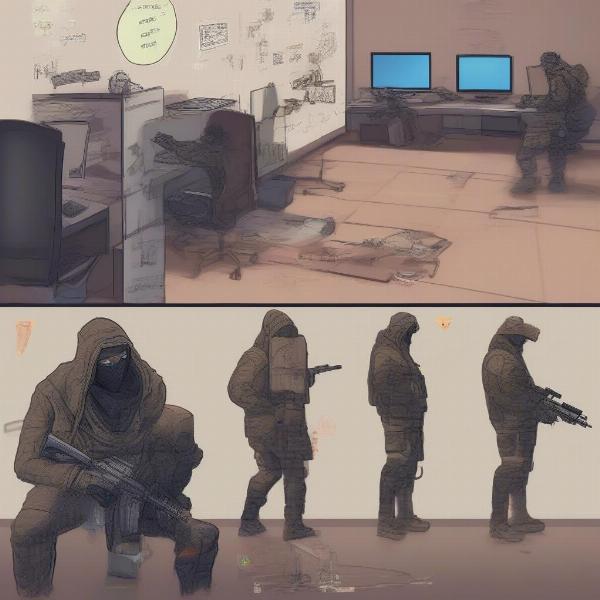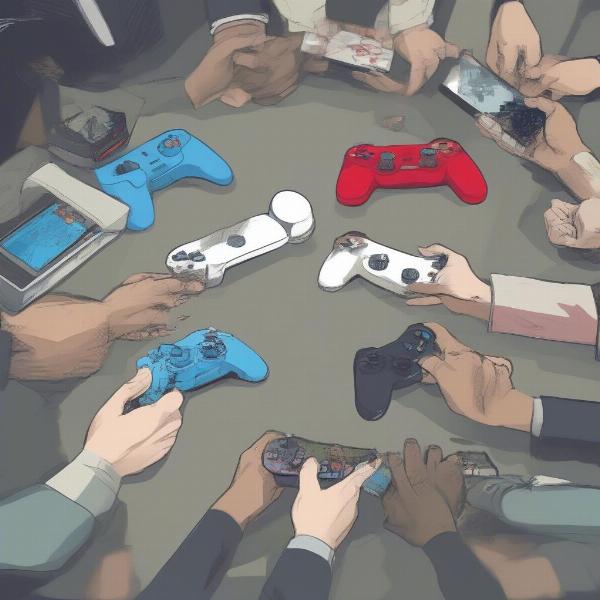The question of why people cheat at games, whether it’s a friendly board game or a high-stakes esports competition, has puzzled gamers and psychologists for years. From seemingly harmless tweaks to blatant exploitation of glitches, cheating takes many forms and has a variety of underlying motivations. This article delves into the psychology behind cheating, explores its various forms, and discusses the impact on the gaming community.
The Psychology of Cheating: Unraveling the Motivations
Why do some players feel compelled to bend or break the rules? Several psychological factors contribute to this behavior. One key driver is the desire to win, often fueled by a competitive spirit. For some, the thrill of victory outweighs the value of fair play. This can be exacerbated by external pressures, such as social status or financial rewards. Another motivating factor is the need for validation. Players might cheat to boost their self-esteem or prove their skill (even if it’s artificial). In some cases, cheating stems from a sense of inadequacy or a fear of failure.
The anonymity offered by online gaming can also contribute to cheating. Hidden behind a screen, players may feel less accountable for their actions and more likely to engage in dishonest behavior. This can be further amplified by the perception that “everyone else is doing it.” Finally, the ease of access to cheats and hacks can lower the barrier to entry for those tempted to take shortcuts.
Types of Cheating: From Subtle Exploits to Blatant Hacks
Cheating in games manifests in diverse ways, ranging from subtle exploits to blatant manipulation of game mechanics. Some common examples include:
- Exploiting glitches: Taking advantage of unintended errors in the game code to gain an unfair advantage.
- Using aimbots: Employing software to automatically target opponents, eliminating the need for skill-based aiming.
- Wall hacking: Utilizing programs that allow players to see through walls, revealing enemy positions.
- Doping: Using performance-enhancing substances to improve reaction time and focus, prevalent in professional gaming.
- Collusion: Secretly cooperating with other players to manipulate game outcomes, often seen in team-based games.
- Account boosting: Hiring a skilled player to play on one’s account to artificially inflate rankings.
 Cheating Methods in Online Gaming
Cheating Methods in Online Gaming
The Impact of Cheating: Eroding Trust and Fair Play
The consequences of cheating extend beyond individual games, impacting the entire gaming community. Widespread cheating can erode trust and create an environment of suspicion and frustration. This can lead to decreased player engagement and damage the reputation of games and platforms. In competitive gaming, cheating undermines the integrity of tournaments and devalues the achievements of legitimate players. The financial and social ramifications for professional players caught cheating can be severe, leading to bans, fines, and reputational damage.
Why is Cheating Wrong?: Ethical Considerations in Gaming
Beyond the practical consequences, cheating raises ethical questions about fairness, sportsmanship, and the value of honest competition. Cheating violates the implicit agreement among players to abide by the rules, creating an uneven playing field. This not only diminishes the enjoyment of the game for honest players but also undermines the sense of accomplishment that comes from genuine skill and effort.
 Impact of Cheating on the Gaming Community
Impact of Cheating on the Gaming Community
Combating Cheating: Developers and Players Working Together
Addressing the issue of cheating requires a multi-pronged approach involving game developers, platform providers, and the gaming community. Developers can implement robust anti-cheat systems, proactively identify and patch exploits, and educate players about the consequences of cheating. Platforms can enforce strict penalties for cheaters, including account suspensions and bans. Players can contribute by reporting suspicious behavior and fostering a culture of fair play.
Preventing Cheating: Building a Culture of Integrity
Ultimately, preventing cheating involves promoting a culture of integrity within the gaming community. This includes educating players about the ethical implications of cheating, emphasizing the value of sportsmanship, and celebrating legitimate achievements. By fostering a positive and supportive environment, we can encourage fair play and discourage cheating.
 Preventing Cheating in Online Games
Preventing Cheating in Online Games
Conclusion: Preserving the Integrity of Games
Why Do People Cheat At Games? The reasons are complex and multifaceted, ranging from the desire to win to the need for validation. Understanding these motivations is crucial to addressing the issue of cheating and preserving the integrity of games. By working together, developers, platforms, and players can create a more enjoyable and fair gaming experience for everyone. Remember, true victory lies in honest competition and the pursuit of skill and mastery. What are your thoughts on cheating in games? Share your experiences and opinions in the comments below.
FAQ
- What are the most common forms of cheating in online games? Aimbotting, wall hacking, and exploiting glitches are among the most prevalent forms of cheating.
- How does cheating affect the gaming community? Cheating erodes trust, diminishes enjoyment, and devalues the accomplishments of legitimate players.
- What can game developers do to combat cheating? Implementing robust anti-cheat systems, proactively patching exploits, and educating players about the consequences of cheating are key steps.
- What can players do to discourage cheating? Reporting suspicious behavior and fostering a culture of fair play are important contributions players can make.
- Why is fair play important in gaming? Fair play ensures a level playing field, promotes sportsmanship, and enhances the overall gaming experience for everyone.
- What are the ethical implications of cheating in games? Cheating violates the implicit agreement to abide by the rules and undermines the value of honest competition.
- How can we build a culture of integrity in gaming? Educating players about ethics, emphasizing sportsmanship, and celebrating legitimate achievements are crucial steps.

